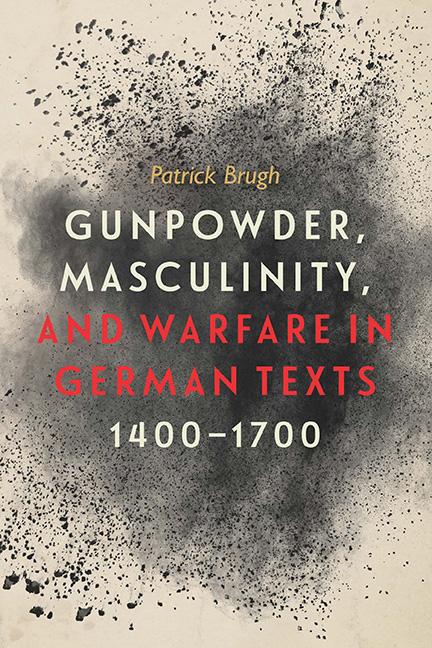Book contents
- Frontmatter
- Dedication
- Contents
- List of Illustrations
- Acknowledgments
- A Note on Translation and Spelling
- Abbreviations
- 1 A Tale of Two Suits of Armor
- 2 Of Hussites and Haystacks, of Questions and Cannons
- 3 Textbook War: The Genealogy of Kriegsbücher
- 4 Gunpowder Dilemmas and Loaded Peace in Fronsperger's Kriegsbuch
- 5 Depicting Gunpowder in German Military Broadsheets (1630–32)
- 6 Gustav Adolf's Gunpowder Demise
- 7 The Aesthetics of Gunpowder in Seventeenth-Century German War Novels
- 8 Cavalier Endings in Happel's Der insulanische Mandorell (1682)
- Appendix: Comparisons of Broadsheets from Battles of Breitenfeld, Rain am Lech, and Lützen
- Notes
- Bibliography
- Index
4 - Gunpowder Dilemmas and Loaded Peace in Fronsperger's Kriegsbuch
Published online by Cambridge University Press: 25 March 2020
- Frontmatter
- Dedication
- Contents
- List of Illustrations
- Acknowledgments
- A Note on Translation and Spelling
- Abbreviations
- 1 A Tale of Two Suits of Armor
- 2 Of Hussites and Haystacks, of Questions and Cannons
- 3 Textbook War: The Genealogy of Kriegsbücher
- 4 Gunpowder Dilemmas and Loaded Peace in Fronsperger's Kriegsbuch
- 5 Depicting Gunpowder in German Military Broadsheets (1630–32)
- 6 Gustav Adolf's Gunpowder Demise
- 7 The Aesthetics of Gunpowder in Seventeenth-Century German War Novels
- 8 Cavalier Endings in Happel's Der insulanische Mandorell (1682)
- Appendix: Comparisons of Broadsheets from Battles of Breitenfeld, Rain am Lech, and Lützen
- Notes
- Bibliography
- Index
Summary
Thus, says Cornelius Nepos in Epaminonda, peace comes through war, and those who want to live in peace and quiet should be people who are practiced at using weapons.
—Wilhelm Dilich, KriegsbuchBooks, even textbooks, reflect the culture in which they are conceived. They also betray the beliefs, the concerns, and the biases of their authors. To interpret Kriegsbücher as mere technical manuals is to underestimate their resonance with broader cultural attitudes about war. And those attitudes reveal a treasury of information about how people were thinking and what they believed about their own and their society's relationship to the practice of warfare. Any analysis of early modern martial discourse ought to be attuned to the literary and cultural qualities of its texts and take into account the values conveyed by even the most supposedly objective communications about military matters. Building on the previous chapter's study of the context and genealogy of sixteenth- and seventeenth-century German books of war, we will now expand on the themes of gunpowder and peace in the Kriegsbuch of Leonhard Fronsperger and other texts included in and peripheral to his opus. Through a primarily discursive and literary analysis that uses both texts and paratexts to build on the work of military historians, this chapter will continue to make the case for the capacity of literary studies to support and refine some of the conclusions that historians have drawn regarding the evolution of gunpowder weapons in Europe. We will continue to hold that the aesthetic, ethical, and gendered issues that are at stake in texts about war are as important to contemplate as the tactical, material, and strategic ideas they convey. Literary and cultural analysis does not replace the methodologies of military history, but it can amplify its conclusions by making explicit the connections between the work of war and the work of culture.
Take, for example, the phenomenal study of gunpowder technology in the Ottoman Empire by Gábor Ágoston, Guns for the Sultan (2005). Ágoston's book demonstrates decisively that Orientalist and Eurocentrist military histories are wrong in their assumption that the Ottoman Empire was an outsider to the military revolution. Instead, Ágoston shows that the Ottomans kept up with and helped drive elements of military development in Europe.
- Type
- Chapter
- Information
- Publisher: Boydell & BrewerPrint publication year: 2019



